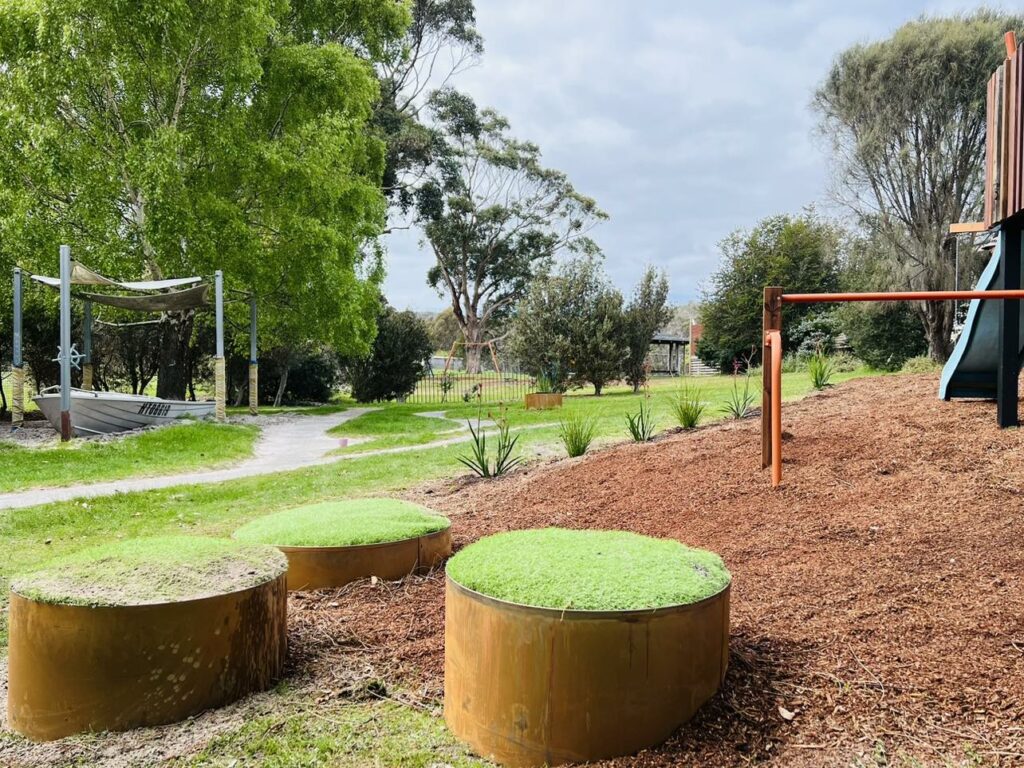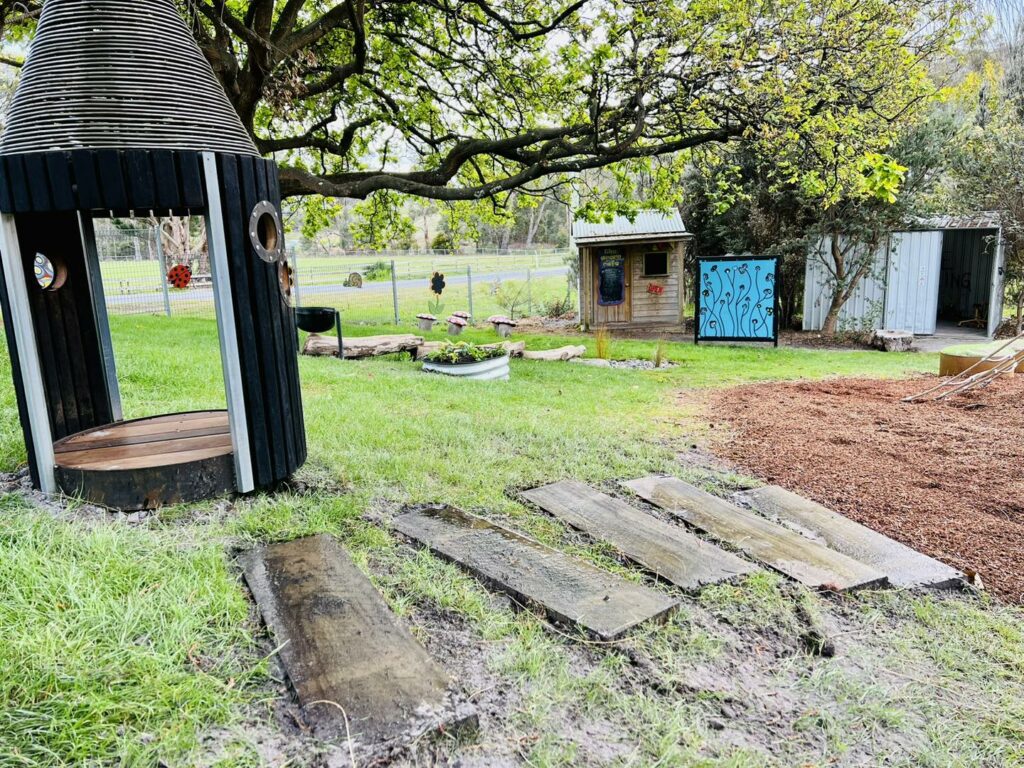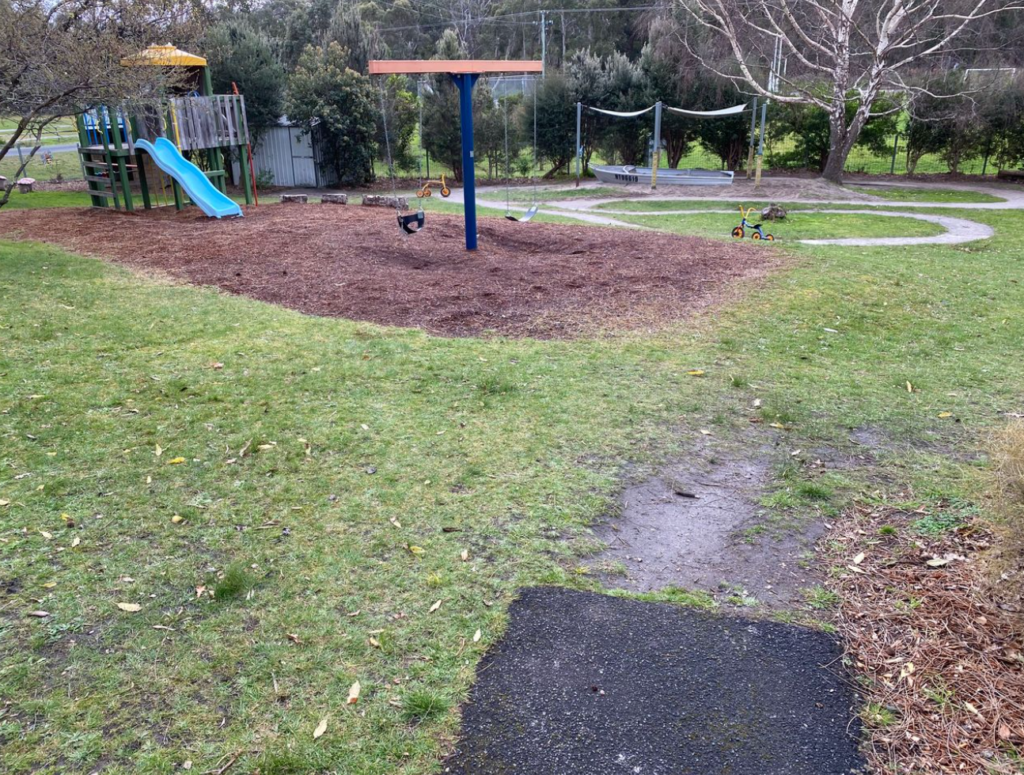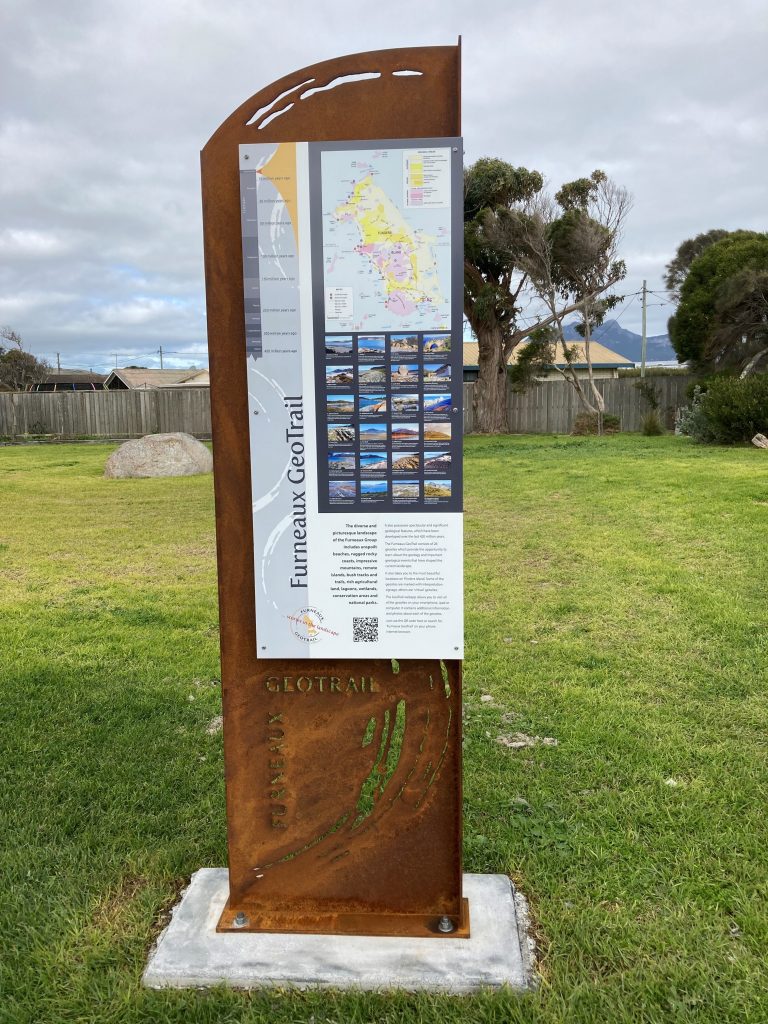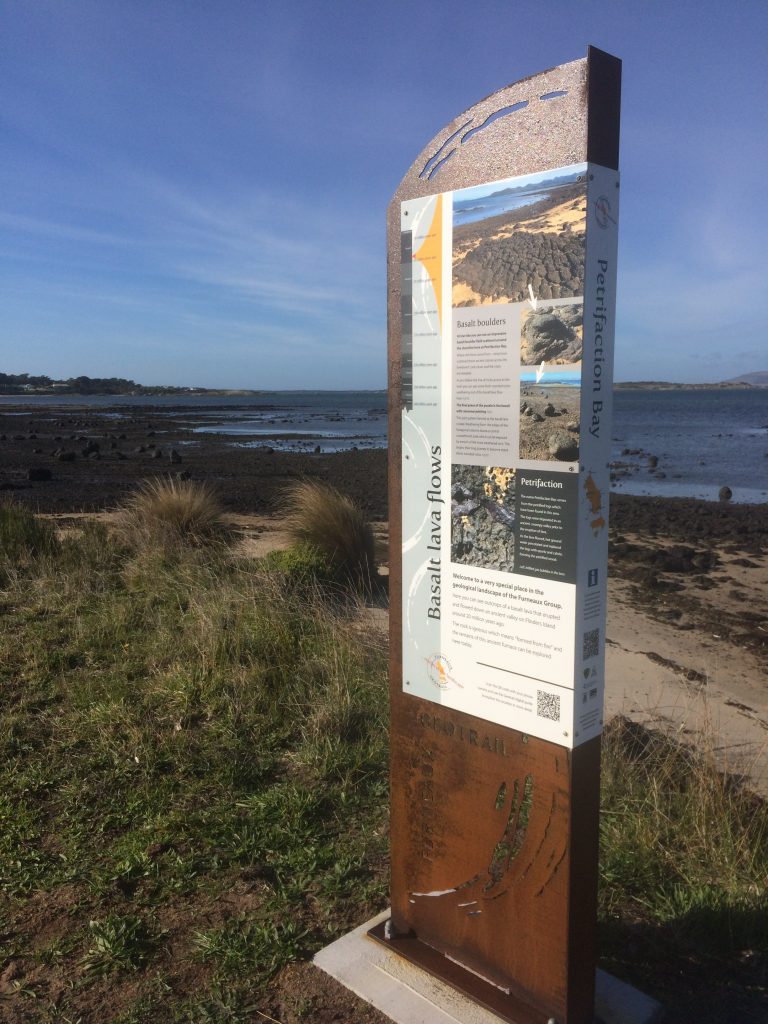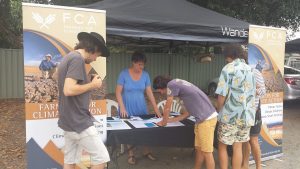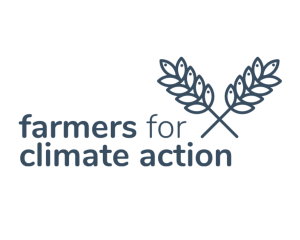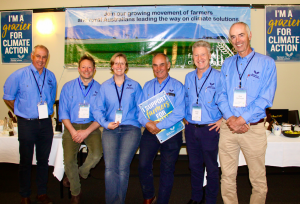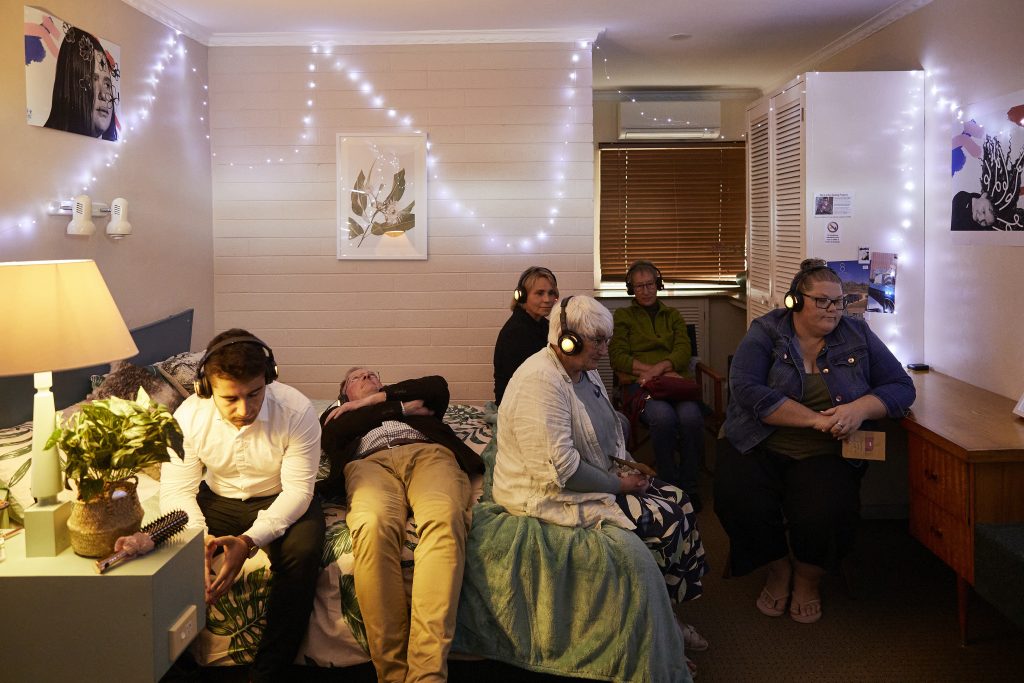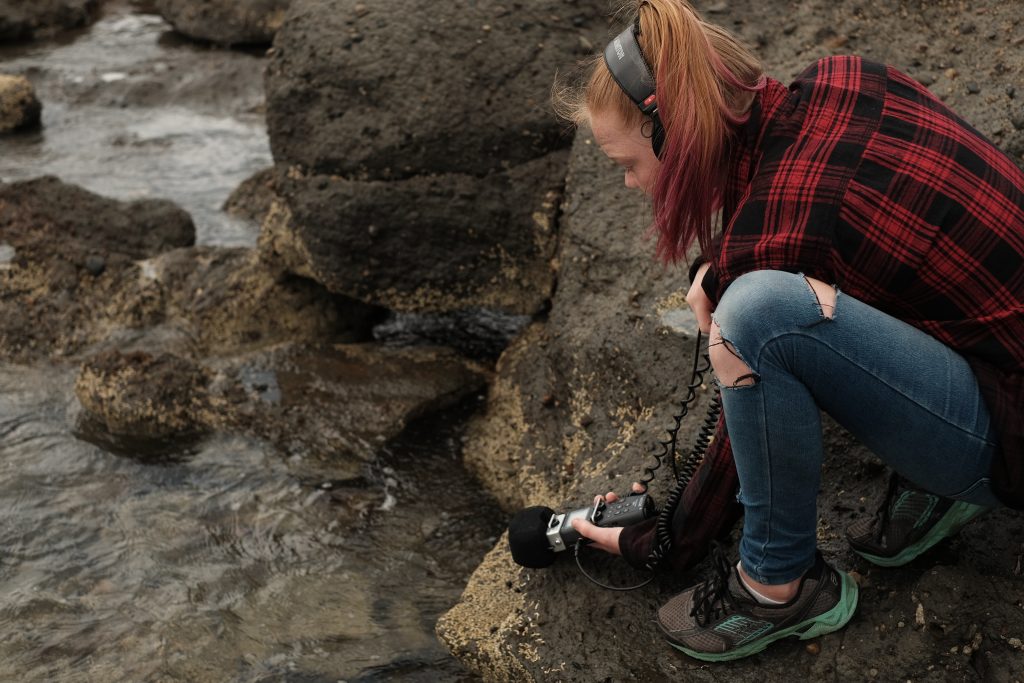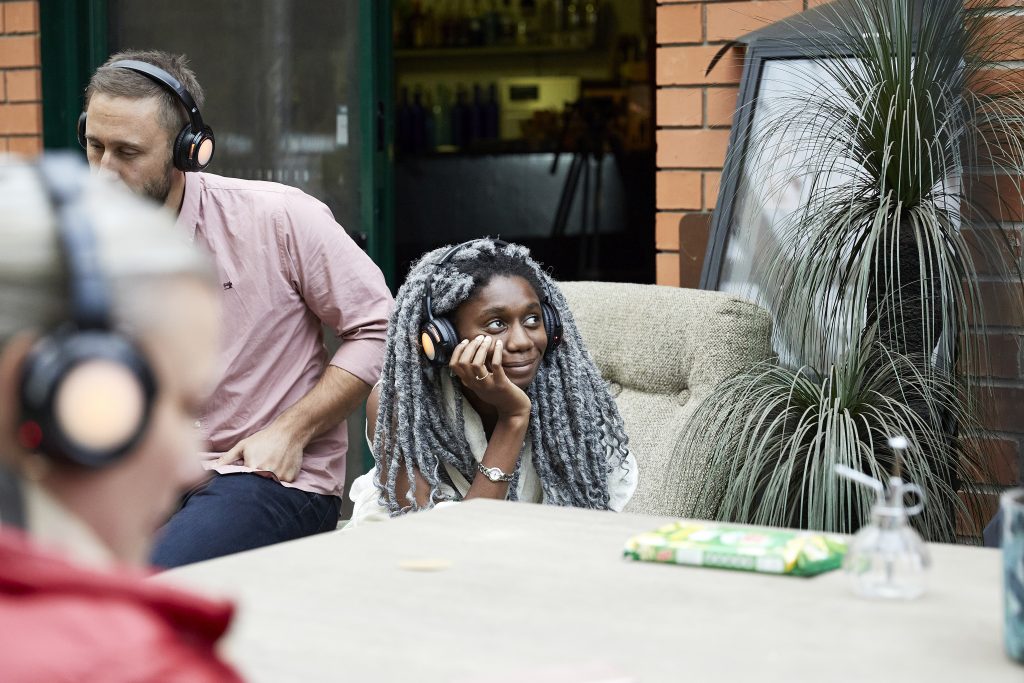Foundation for Rural & Regional Renewal (FRRR)
In 2020 the Bruny Island District School Parents & Friends committee identified the need to upgrade the ‘Billabong Playground’, which caters for children up to five and their families.
Working with a local landscaper, the plan was to retain the swings, cubby house, bike path and sandpit and add an above ground timber tunnel with climbing grips over it, a small princess castle and artificial grass covered seats/jumping pods. They also intended to create a safe water play area incorporating a cauldron that fills with water and can be released via a plug. This flows into a wetland area beyond the playground fence. All this would be surrounded by plants and surfaces that stimulate sensory play.
While there were some changes along the way, the main installation and repair took place in early October 2022 and was ready for use mid-October. The work was undertaken by a local contractor, with volunteers adding plants and the artificial grass seats, as well as some timber sleeper steps in mid-October 2022.
The project was supported by a $10,000 SRC grant, thanks to the support of the Bertalli Family Foundation. However, local businesses were also asked to contribute to the project, which meant they could also install a timber shelter. The Playground is now fully functional with the 65+ students from the school and wider community being able to access it.
But the project resulted in far more than just a great play space for the children. It has strengthened the connections between the school and local businesses and the community more broadly. Additionally, the project gave a small group of volunteers the confidence to know that they can achieve great outcomes to improve their community. They displayed courage and aspiration, values that have been included in Bruny School’s values and it’s fantastic for the students to see the results they can bring, not only individuals but the entire community and future generations.
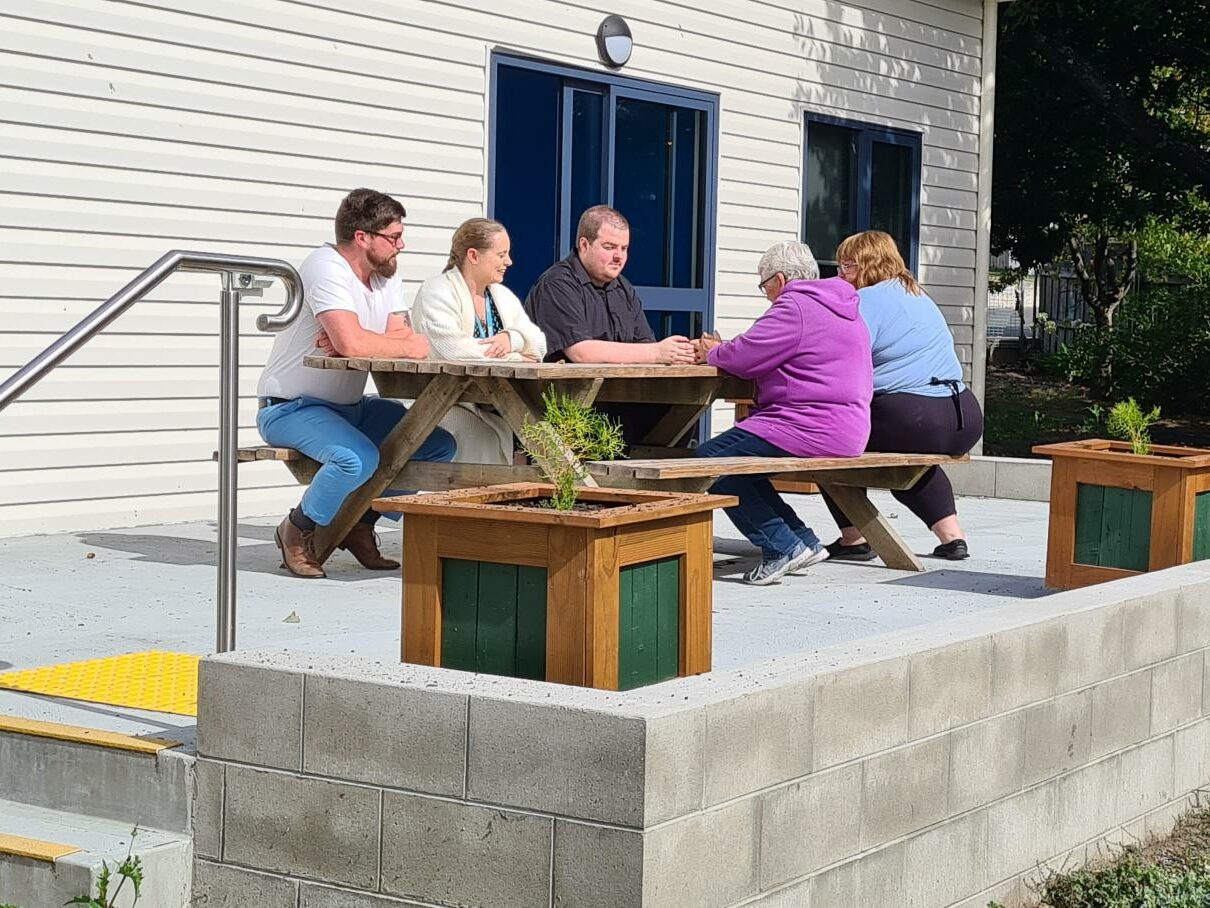
New Norfolk, a pretty town on the banks of the Derwent River and Tasmania’s third oldest settlement, is home to a significant number of community members vulnerable due to age, socio-economic impacts and existing physical and mental health issues. The Derwent Community House provides a welcoming space for the New Norfolk community, servicing a catchment of over 5,000 people in an otherwise under-served region of Tasmania. The House offers access to training, educational & employment pathways, and programs to connect and support vulnerable community members.
The DVCH moved into the old kindergarten site in 2017, receiving state government funding to renovate the facility, although a lack of space has restricted the delivery of activities and services. The Community House identified a shower facility and outdoor activity spaces as the highest priorities to further improve the facility’s functionality.
A $10,000 Strengthening Rural Communities (SRC) grant supported by the Sidney Myer Fund, matched funds raised by the Community House to enable the new outdoor deck and shower room to be created. The building has been transformed into a thriving community hub and the enhanced facilities have been eagerly embraced by local community members. The outdoor deck is a popular space for meetings, activities and gatherings, fostering opportunities for greater community connection. The accessible shower facility supports community members who may lack access to shower facilities or hot water.
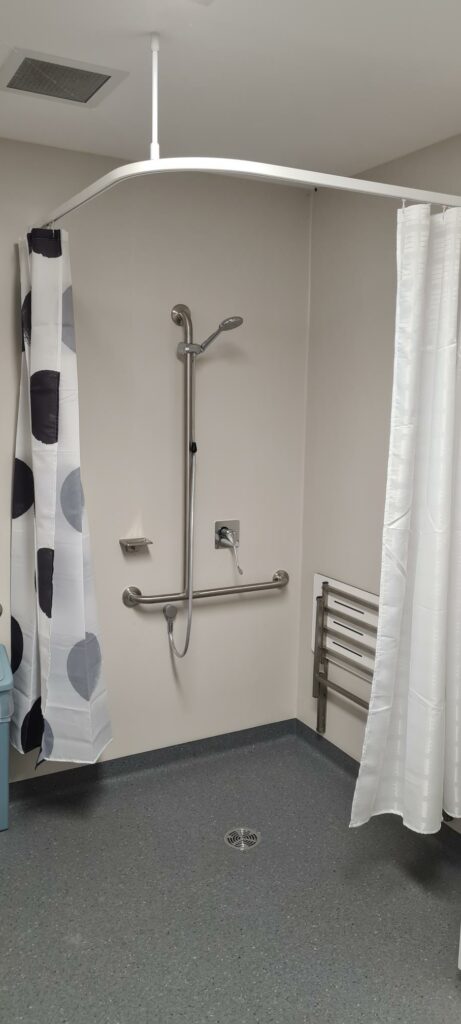
The House co-coordinator, Dianne Booth emphasised the importance of the accessible shower facilities. “Some Community members do not have access to shower facilities for a number of reasons, often as a result of homelessness and/or the inability to meet the cost of services such as electricity. Not having access to a shower has far reaching impacts, not only on a person’s health, but on their mental wellbeing. It also has a major impact upon a person’s ability and/or willingness to participate in activities, even within their own social and family circles, let alone within the wider community.“
These improvements have boosted the Community House’s ability to address the diverse needs of the community and improve health and wellbeing.
Dianne said the project “has gone a long way towards achieving our goal of providing our community with opportunities to feel connected, included and respected. Some people express that they simply feel more comfortable in an outdoor setting, but due to factors such as weather, personal health & mobility issues, this is not always practical without modified spaces to gather.
“Having a modified outdoor space also provides us with an opportunity to address our forward planning to include an outdoor kitchen facility to provide even more scope for community engagement.”
Huon Valley council acknowledges Traditional Custodians of the South East Nation, the Melukerdee people of the Huon River and the Lyluequonny people of the Far South.
Following a number of suicides in the Huon Valley in southwest Tasmania, the community indicated an interest in learning more about mental health and how to best support a family member, friend or colleague who may be struggling with their mental health.

With the help of a $9,255 grant through the In a Good Place program, supported by CCI Giving, the Mental Health Community Response project was initiated. Its goal was to build capacity in the Huon Valley to respond to and prevent suicide and promote mental health through the delivery of mental health first aid training to community members and groups. By providing the tools, community members could better understand and support members of the local community who may be self-harming or suicidal.
The Huon Valley Council took on a project coordination role, working closely with the Rural Alive and Well program, to reduce the stigma of suicide by promoting events widely across the community, encouraging conversations about mental health. They also ran three 12-hour Mental Health First Aid programs across some of the smaller communities in the Huon Valley, as well as delivering two self-injury focused workshops to community members struggling to support family members who self-harm.
The Huon Valley Council’s contribution was significant, as participants appreciated being able to complete the training at an affordable cost and within their own local community. COVID posed several challenges, with the delivery of training delayed, as it was agreed that face-to-face sessions were important, given the nature of the training.
Communities and individuals in the Huon Valley are now better equipped to support each other, their community, family members and colleagues dealing with serious mental health issues such as self-harm or suicidal ideation. Community networks were built and reinforced by the project. At the completion of the project, participants had the confidence and resilience to share stories and have conversations in a secure and inclusive environment, to further reduce barriers associated with discussing mental health and suicide.
For more inspiring stories like this, head to our FY 2021/22 Annual Review.
The Furneaux Historical Research Association is located in Whitemark on Flinders Island in Tasmania. Founded in 1964, they’re a volunteer organisation responsible for the Furneaux Museum and the conservation of artefacts pertaining to the natural and cultural heritage of the Furneaux region.
The museum plays a significant role in the vitality of the small and remote isolated community, attracting more than 2,000 visitors each year. It’s also a popular gathering place for the community for exhibition openings and special events.
Thanks to the help of an FRRR grant of $24,924, funded by a private donor, through the Strengthening Rural Communities program, the Furneaux Historical Research Association was able to complete the second stage of the Furneaux GeoTrail project.
The Furneaux Group consists of more than 50 islands in Bass Strait, just north of Tasmania. Their rugged and picturesque landscapes contain impressive geological features developed more than 600 million years ago. Many visitors and locals marvel at the vistas in the remote region but before the GeoTrail project, very few people were aware of just how special the geology is.
The GeoTrail project is all about linking the people who live in and visit the Furneaux region to the landscape, educating them and providing them with information in an easy and accessible way.
Stage one of the project was rolled out in 2019 and consists of a self-drive experience made up of 10 interpretive signs in areas of geological significance, easily reached by road. The innovative trail includes a mobile app and is the only one of its kind in Australia.
Stage two of the project saw the extension of the GeoTrail out into areas of geological significance accessible by walking, biking, 4WD, sailing or kayaking. These more remote areas contain examples of unusual and striking rock formations, telling the story of how the islands originated and evolved.
The completed Furneaux GeoTrail offers a world class user experience across the island group that attracts new people to the area, engages those who use it directly, and allows local community and business entrepreneurs to use their creative energies and leverage the GeoTrail to seek out future opportunities.
“We are very proud of the fact that the GeoTrail is bringing our local community and those who visit Flinders Island closer to the geology and the environment around them. It’s so rewarding to hear people talking about rocks! We are also very proud of the huge amount of work done by our volunteers in completing the project.”
Dr Dale Williams, Project Manager
For more inspiring stories like this, head to our FY 2021/22 Annual Review.
Students Against Racism (SAR) is a youth organisation based in Hobart, Tasmania. They believe that ‘in diversity lies strength’ and they seek to build a stronger more welcoming and supportive community by sharing stories and addressing misconceptions.
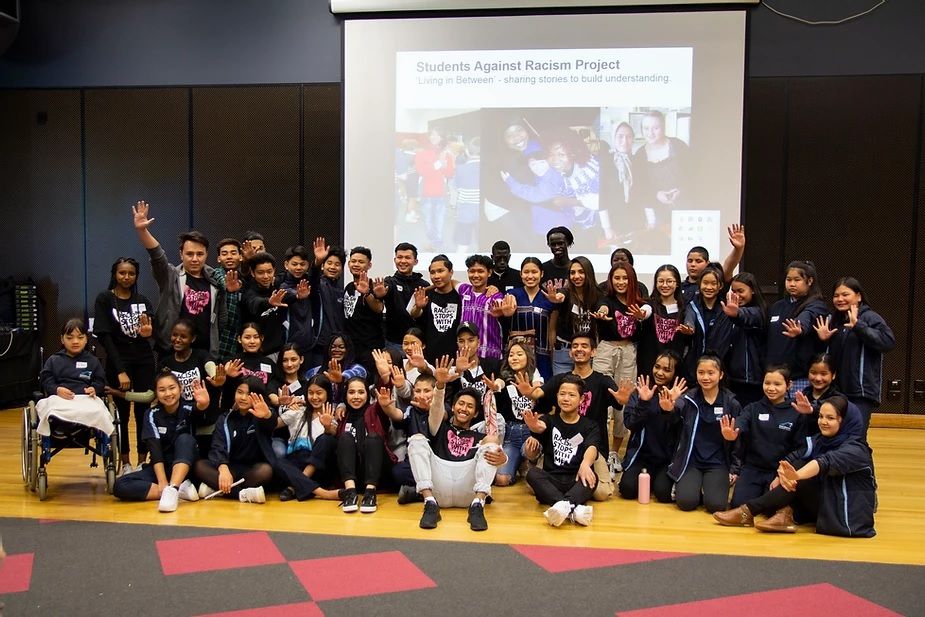
It was formed in 2008 by multicultural youth with lived experience in just how damaging direct acts of racism from their community can be. Recognising that ignorance was a big part of these acts, they sought to change the way their community saw people from different cultures through the path of education.
For over a decade SAR have developed and delivered integral and multi award-winning learning tools that have since been incorporated into various organisations – including schools and community groups, the Tasmanian police recruit training program and a number of TasTAFE courses. A part of these programs involves teaching participants about the issues and challenges facing multicultural youth who are new to the Tasmanian community.
As the proud recipients of a $7400 grant from FRRR’s HEYWIRE program, supported by the Sally Foundation, SAR attended the 2019 HEYWIRE Conference and made some long-lasting and vital connections that have since flourished into a greatly beneficial foundation for interstate learning.
The funding allowed 18 SAR representatives from various cultural backgrounds to travel from Hobart to Bendigo and present their flagship educational anti-racism program ‘Living in Between’ to 110 local youth at Eaglehawk Secondary College in the Bendigo region. The workshop involved presentations, small group work, activities and training, and allowed a safe environment to ask questions in order to foster understanding and compassion for those with multicultural backgrounds.
“The program gives the students the platform to explain why they left their homelands, the journey that brought them to Australia, and their lives now.”
Seeing the deep-seated impact that the SAR representatives could make via their anti-racism program, the students and youth from the Bendigo region indicated that were inspired to hold their own similar workshop and have since done so with great effect.
Through delivering this invaluable program, the youth of SAR have significantly gained self-confidence, increased teamwork and support, and have fostered deeper connections not just within their group but with the greater community. Helen Hortle who has been integral in the coordination of the educational adventure is pleased as punch with the outcome.
“It has been a fantastic experience for young members of SAR – one that wouldn’t have been possible without FRRR funding and support. Thank you!”
Farmers for Climate Action (FCA) is a growing organisation that has made it their priority to spread the word amongst those in agriculture that it’s time to act on climate change.
In a sector steeped in custom, tradition and routine, being a champion for change can sometimes prove challenging. FCA’s savvy approach to facilitating change and the traction they’ve gained in a relatively short time indicates that there are many that share their desire to take action. They have spent the last few years building their foundations and growing their programs, which not only inform and educate, but are facilitating lasting change at a grassroots level.
One such program is the Climate-Smart Fellowship, which was recently delivered to more than 50 forward-thinking farmers in Tasmania, Queensland and Victoria. It entails training on critical subjects such as climate smart agriculture, climate change science and local capacity building. The program featured experts presenting topis including on-farm change, renewable energy, regenerative agriculture, communications and building advocacy in their local region. These new agents of change were then encouraged to take these learnings into their local area through events, community outreach and calls to action.
By adopting this kind of approach, FCA has expanded their network exponentially, teaching and inspiring a growing nationwide network of farmers. These producers are now equipped with the skills, support and resources – and no doubt the passion – to employ smart farming practises to minimise their impact on the environment.
With FRRR’s support over the past few years, primarily through a Not-For-Profit fundraising account, FCA has grown from a well-intentioned group of dedicated people to a well-funded and structured organisation with a strong foothold in the area of actioning climate change in Australia.
FCA established the account in 2017 to allow them to leverage FRRR’s special tax status to bolster their fundraising whilst they sought to obtain DGR endorsement. In total, $823,340 was raised through the account, thanks to FCA’s focused efforts on crowdfunding appeals, monthly donor programs, corporate donations and various grants.
Recently FCA secured DGR-1 status allowing them to offer their donors tax deductibility, so they no longer need the partnership with FRRR to support their fundraising. However, James Atkinson, Fundraising Manager at FCA, says that the support from FRRR was critical in the success of the organisation.
“Our partnership with FRRR has been crucial in securing new funding relationships, both due to the fundraising account and the strength of our relationship in rural and regional Australia. Several funders reported that they were pleased to hear we had such a close relationship with FRRR.”
James Atkinson, Fundraising Manager at FCA
Natalie Egleton, FRRR CEO, said “The ongoing positive impacts of FCA’s programs in remote, rural and regional Australia is a credit to their commitment and we look forward to continuing to support and amplify FCA’s activities into the future as they go from strength to strength.”
Tommeginne Country
A group of young women from Tasmania’s north coast have taken ownership of their stories, thanks to a Strengthening Rural Communities grant.
For 27 years, Big HART Inc has found innovative ways to respond to disadvantage on the north-west coast of Tasmania. Young women are a particularly challenged cohort, but a program run by Big HART helps them build confidence and skills to succeed and steer their course away from negative social outcomes, at the same time as learning new digital skills.
Radio Diaries pairs young, disadvantaged women with professional audio artists to create compelling podcast pieces exploring the lives of young women, like themselves, growing up in a disadvantaged community.
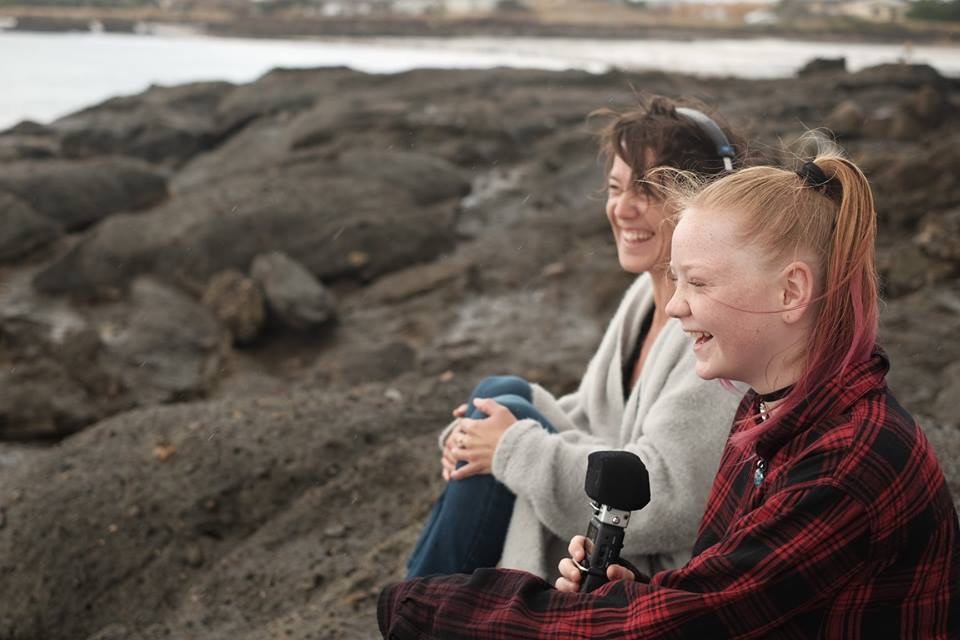
A $10,000 grant, funded by the Bertalli Family Foundation, supported the development and presentation of the podcasts, including delivery of the workshops and mentoring. The participants, aged between 11 and 15 and at risk of disengaging from school, were identified by local schools, Rural Health Tasmania and youth services. Interest in the project and numbers for the audio skills workshops exceeded expectations.
What emerged was a compelling body of work. Radio Diaries was showcased at a celebratory community dinner, attended by 70 community members, to mark International Women’s Day in March 2020 including Government representatives. This included Trinity’s story, (watch – Facebook video with animation), which has since been showcased at an online audio conference presented by a leading podcast agency, and picked up by the ABC (listen).
“One of the key benefits of this event was that a number of young women who may ordinarily struggle with systemic challenges were able to feel heard. They were able to share their stories with a room full of community, friends, family, political and business representatives, and feel that they were being taken seriously.”
-Sam Hawker, National Producer, Big HART Inc
Through Radio Diaries, these young women became the storytellers and drivers of changing perceptions around their capabilities. They were given the chance to engage with others in the community and be trained up as citizen journalists, equipping them with new digital abilities, and bringing them a step closer to being prepared for the jobs of the future, armed with new confidence and support.
In the communities of the Southern Beaches in Tasmania, which are home to around 5,000 residents, Okines Community House supports local residents through a range of programs offering opportunities for connection, learning and support. At the side of the House, a three-square metre converted shed houses the Food Co-op, which has 120 members including 55 active volunteers, and is highly valued in the community.
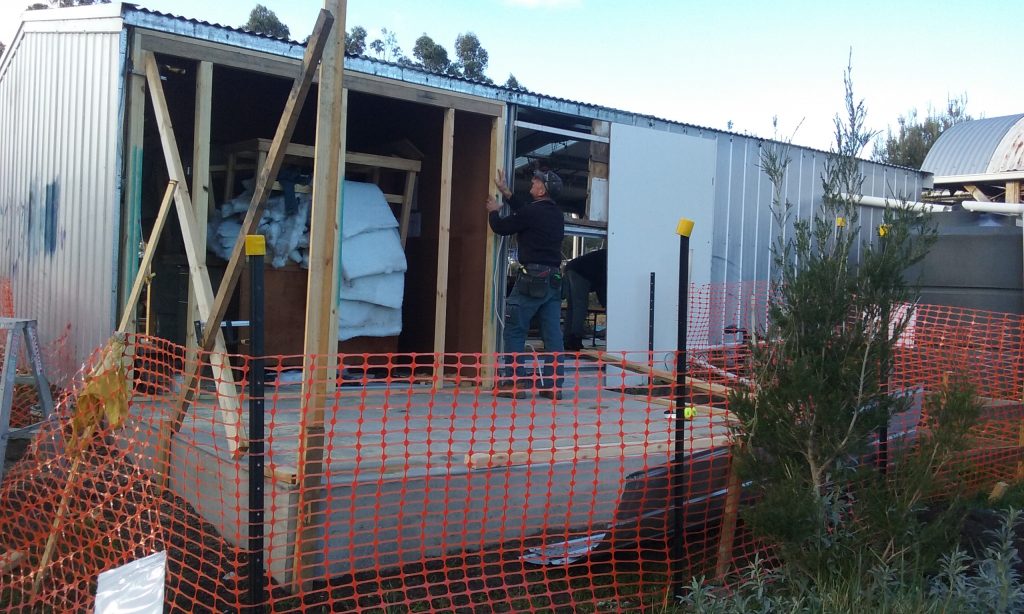
The Co-op runs a food assistance program for families in need, including a Breakfast Club, and the school and other local organisations purchase food from the Co-op for their programs. It plays an important role in providing access to nutritious, organic, ethically and sustainably sourced food with minimal packaging at affordable prices. The location is very convenient too, but the space is small.
Despite the Co-op volunteers resourcefully using every nook and cranny in the small shed, the lack of space was still very limiting for this growing enterprise, with shoppers cramped and having to wait outside when queuing to pay and nowhere to store orders for pick up.
To allow the venture to grow, Okines Community House sought funding from the Strengthening Rural Communities program. Their application outlined a 2×4 metre extension to the shed that would be used for storage and display, with a local contractor enlisted to build the extension, and in-kind support from OCH and Co-op volunteers in site preparation and cleaning.
With a $10,000 grant funded by John T Reid Charitable Trusts, they set to work in early 2020, and despite the challenges of COVID-19 restrictions, finished the extension in July 2020.
Their new space is user friendly – shoppers move around with more ease, and volunteers can work without bumping into one another! This is an expansion of infrastructure that has improved the efficiency and experience of the enterprise for everyone involved.
West Coast Connect (WCC) was established in 2013 to support social and economic development around Queenstown and the west coast of Tasmania. With a staff of four, a committee of five, and 25 volunteers, WCC aims to provide supportive core services that encourage a shared, communal impact to socio-economic issues within the community and the region.
Growing training opportunities
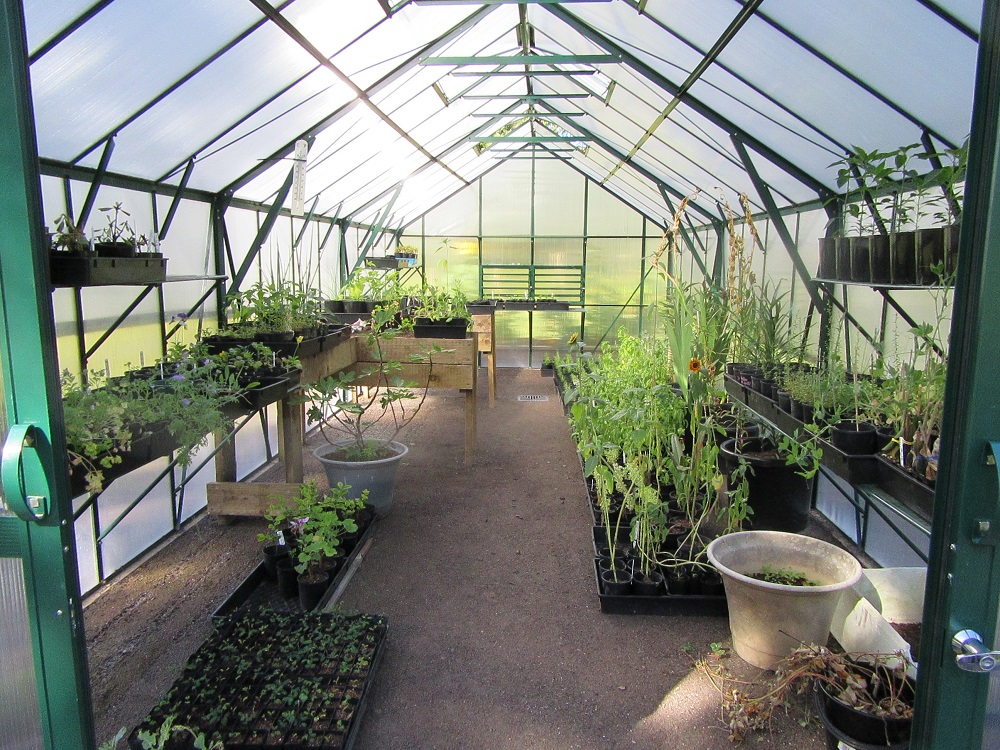
With the West Coast of Tasmania losing their TAFE Tasmania Campus over 10 years ago, community members only had access to training organisations that are located a minimum of 200km away.
To address skill shortages and provide job opportunities, WCC decided to offer vocational training in horticulture, conservation, land management and landscaping. They devised a plan for a new training facility to offer short courses and vocational training in conjunction with TasTAFE – BUT first they needed to equip the training grounds with essential infrastructure.
On the ground training aims to raise local employment
WCC secured a Strengthening Rural Communities grant of $9,200 to purchase a greenhouse, garden beds and planter boxes that were accessble by people with mobility issues. This equipment was manufactured by Qnique Products, a Social Enterprise that engages in vocational carpentry and joinery training for unemployed residents and residents with disabilities.
The horticultural facilities serve as a practical learning area, both as a hands-on training ground for vocational training in horticulture, landscaping and conservation and land management, and for the wider community, as an area for exploring and learning about growing organic foods, growing herbs, establishing and maintaining a cottage garden or growing fruit trees in a harsh climate.
Having the greenhouse also meant WCC could commence the Training and Work Pathway Program – for long-term unemployed jobseekers. Participants were involved in the initial establishment of the center, from building the access path to putting in place the raised garden beds and building in ground ones.
“Community interest in the centre was great from the beginning. Community short courses run at the centre were very popular and received great feedback. Enquiries about further courses are constant.”
Unexpected value for the community at large
Additionally, the Centre proved to be of great value to the community after the Queenstown community garden was forced to close in August 2020. WCC now sees a need to further develop the centre for greater access to the community at large and wants to establish mini-greenhouses and garden beds for local residents with an interest in gardening but no opportunity to do so at their home.
“West Coast Connect wishes to express our thanks for the grant money. Without this funding, the establishment of the horticultural training and discovery centre would not have gone ahead due to financial restraints.”
If you head north along the stunning beaches of the Kingsborough coast in southern Tasmania, you are bound to hit the town of Kingston. It’s one of the more central points on this 300km long beach, and the home to about 1,990 people.
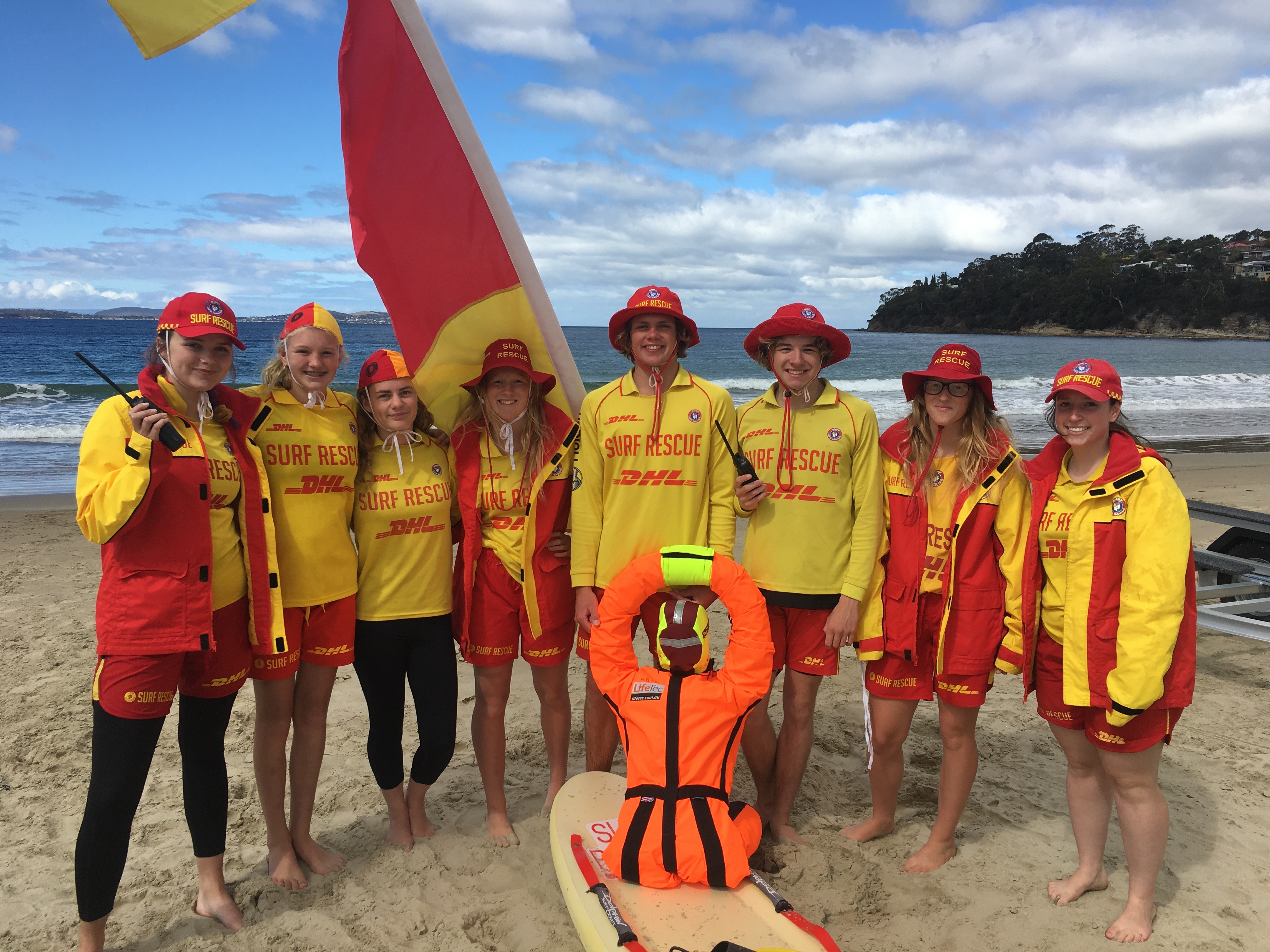
Though small in size, Kingston plays a big role in coast-safety for a good chunk of southern Tassie. The Kingston Beach Surf Life Saving Club (KBSLSC) is the most accessible lifesaving club in the south, and therefore part of the Surf Life Saving Tasmania’s emergency response services. The Club provides equipment and volunteer personnel that are on-call 24/7, ready to respond to emergency situations as tasked by TasPol.
The KBSLSC is community-run and supported by a group of volunteers – passionate locals between the ages of 15 to 70 – who all take their job of beach-safety very seriously. Last year, the Club wanted to increase their preparedness for, and ability to respond to and recover from, emergency flood and bushfire events. Having heard of the FRRR Strengthening Rural Communities grant program, they decided to give it a go, and wrote a great application explaining why they needed new equipment, and how it would benefit their community. We were impressed by their commitment to increasing disaster preparedness and resilience and, needless to say, the application was approved!
The $3,382 grant, generously funded by Australia Post, allowed them to purchase an inflatable rescue boat training dummy, Bluetooth ICOM waterproof radios and stereo headsets – exactly what they needed to conduct their new water rescue and evacuation training.
With this new equipment on hand, the members were excited about their new state-of-the-art gear and the ability to train for real life rescue scenarios. “We are proud of our members using the equipment often and when needed,” the Club said in their assessment. They also told us the ‘dummy’, in particular, was an instrumental piece of equipment for the patrolling members, as it made the training more realistic and effective.
They were all very pleased to have made the community an even safer place in the event of natural disasters. “We just wish we had more surf at our beach!” an SLSC staff member said.

